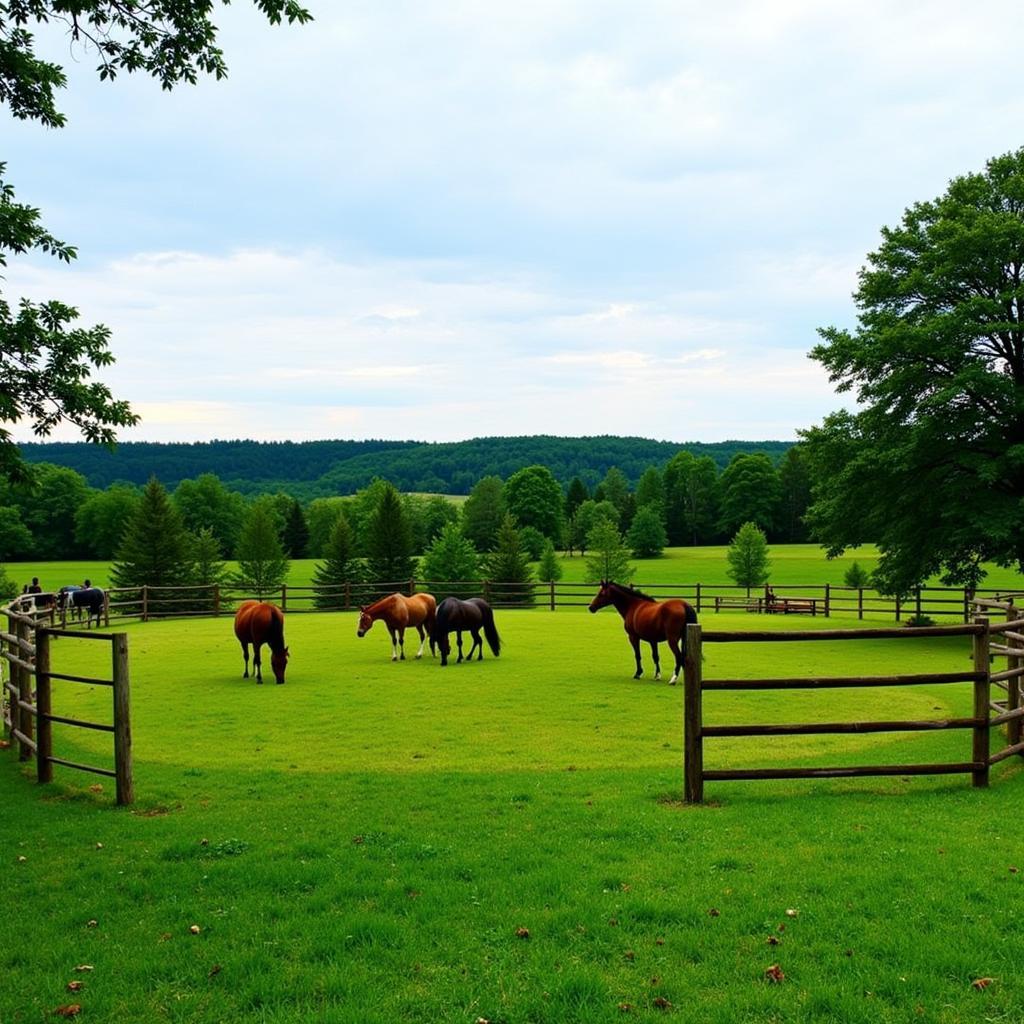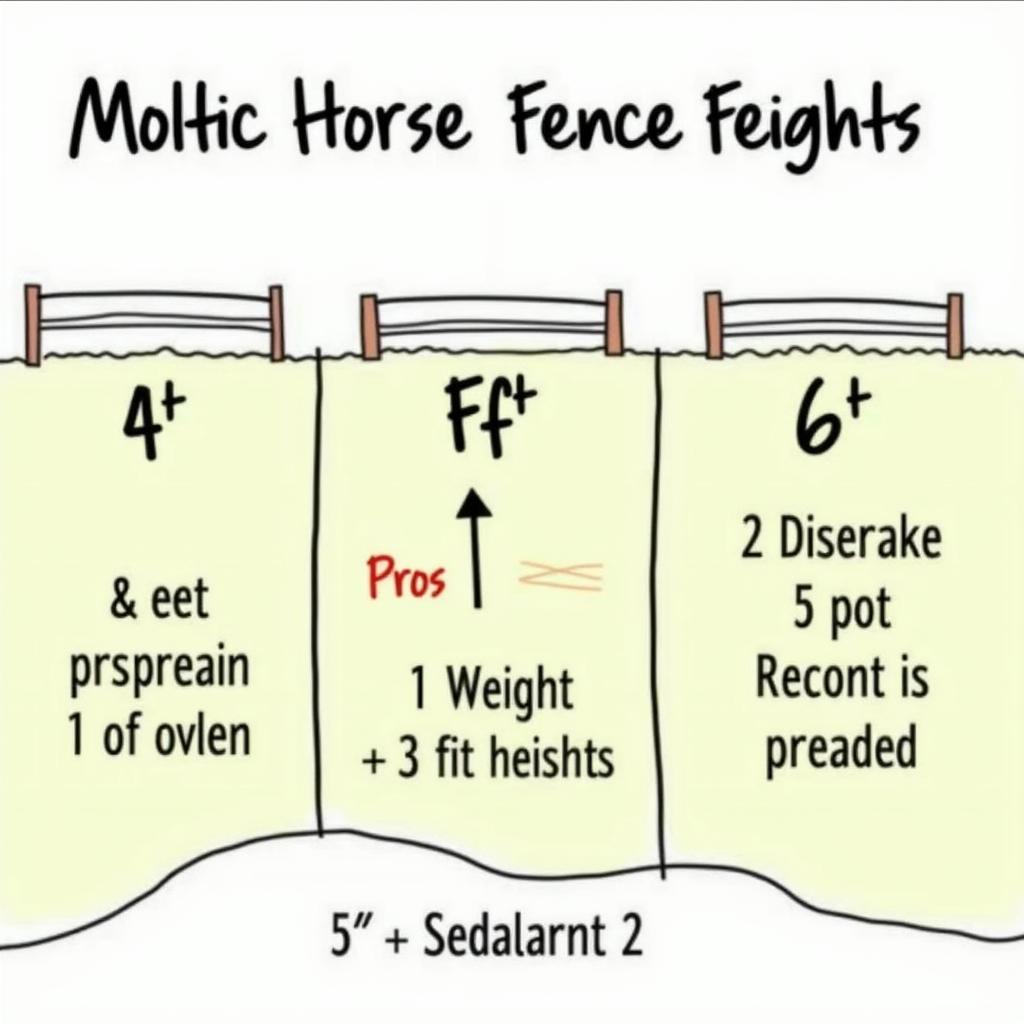When it comes to keeping your equine companions safe and secure, a well-built and properly maintained horse fence is non-negotiable. A 5′ horse fence is a popular choice for many horse owners, and for good reason. This height offers a good balance of visibility, containment, and safety for most horse breeds.
 Horses grazing in a pasture enclosed by a 5-foot fence
Horses grazing in a pasture enclosed by a 5-foot fence
Why is Fence Height Crucial?
Before we delve into the specifics of a 5′ horse fence, it’s essential to understand why fence height is so critical in the first place. Horses are naturally inquisitive and athletic animals. A fence that’s too low can be easily jumped or stepped over, increasing the risk of escape and potential injury. On the other hand, a fence that’s too high can be visually imposing and may not offer the same level of visibility for horses to see each other and their surroundings, potentially leading to anxiety or accidents.
The Benefits of a 5′ Horse Fence
A 5′ horse fence strikes a good balance for many horse owners, offering a range of benefits:
- Deters Jumping: A 5′ fence is generally tall enough to discourage most horses from attempting to jump over it.
- Safe Containment: This height helps prevent horses from accidentally stepping over the fence or getting their legs caught.
- Good Visibility: Horses can still see each other and their surroundings, promoting a sense of calm and security.
- Aesthetically Pleasing: A well-maintained 5′ fence can enhance the visual appeal of your property.
 Comparing different horse fence heights
Comparing different horse fence heights
Factors to Consider When Choosing Fence Height
While a 5′ horse fence is a popular choice, the ideal height for your horses may vary depending on several factors:
- Breed and Size: Taller horse breeds like Warmbloods or Thoroughbreds may require a taller fence compared to smaller breeds like ponies or Miniature Horses.
- Temperament: Horses known for their jumping ability or those prone to escaping may need a taller, more secure fence.
- Terrain: If your pasture has uneven terrain, you may need a taller fence in certain areas to compensate for changes in elevation.
- Local Regulations: Check your local zoning ordinances for any regulations regarding fence height for livestock.
Types of 5′ Horse Fencing
Once you’ve determined that a 5′ horse fence is right for your needs, you have several material options to choose from:
- Wooden Fencing: Four board horse fence offers a classic look and good visibility.
- Vinyl Fencing: Durable, low-maintenance, and available in various styles.
- Mesh Wire Fencing: Affordable and provides good visibility, but may not be as aesthetically pleasing.
- Pipe Fencing: Strong and durable, but can be more expensive.
- Electric Fencing: Used as a psychological barrier and often paired with another type of fencing.
The best type of fencing for your property will depend on your budget, aesthetic preferences, and the specific needs of your horses.
Maintaining Your 5′ Horse Fence
Regular maintenance is essential to ensure the longevity and effectiveness of your horse fence.
- Inspect Regularly: Walk your fence line at least once a week to check for any damage, loose boards, or potential hazards.
- Repair Promptly: Address any damage or wear and tear immediately to prevent further deterioration and potential injuries.
- Paint or Stain: Wooden fences will benefit from regular painting or staining to protect the wood from the elements.
- Keep Clear: Remove any vegetation or debris that may be growing near or on your fence.
Expert Insights
“Remember,” says seasoned equine veterinarian Dr. Emily Carter, “a safe fence is an investment in your horse’s well-being. Don’t skimp on quality materials and regular maintenance. A well-maintained fence can last for years and provide peace of mind.”
Beyond the 5′ Horse Fence: Additional Safety Measures
While a 5′ fence provides a significant safety barrier, consider these additional measures:
- Hot Wire: Adding a hot wire to the top of your fence can further deter jumping.
- Safe Gate Placement: Ensure gates are sturdy and strategically placed to minimize the risk of horses crowding or escaping.
- Paddocks and Shelters: Provide ample space for horses to move around and seek shelter from the elements.
Conclusion
Choosing the right fence for your equine companions is a crucial aspect of responsible horse ownership. A 5′ horse fence offers a balance of height, visibility, and security for many horse breeds. By carefully considering your horse’s individual needs, researching different fencing materials, and prioritizing regular maintenance, you can create a safe and secure environment for your horses to thrive.
If you need assistance choosing the right fence or have any questions about horse care, don’t hesitate to contact us. Call us at 0772127271, email us at [email protected], or visit us at QGM2+WX2, Vị Trung, Vị Thuỷ, Hậu Giang, Việt Nam. We’re available 24/7 to help you with all your horse care needs.